The Forgotten Rebels of Eureka (64 page)
Read The Forgotten Rebels of Eureka Online
Authors: Clare Wright
Tags: #HIS004000, #HIS054000, #HIS031000

Anastasia Hayes.
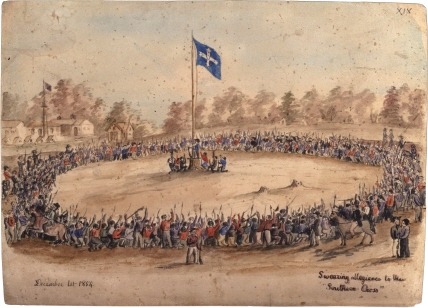
âThe Australian Flag' gets its first airing. Charles Doudiet, 1854.
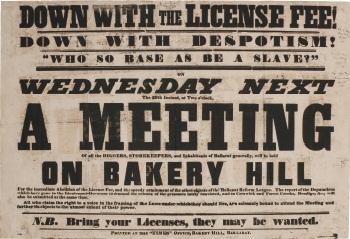
Original meeting placard, rallying âthe inhabitants of Ballarat generally' to Bakery Hill on 29 November 1854.
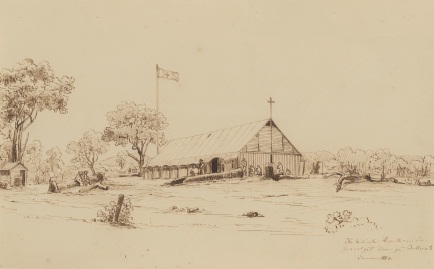
St Alipius Catholic Church with mass flag flying, as depicted by von Guérard in January 1854.
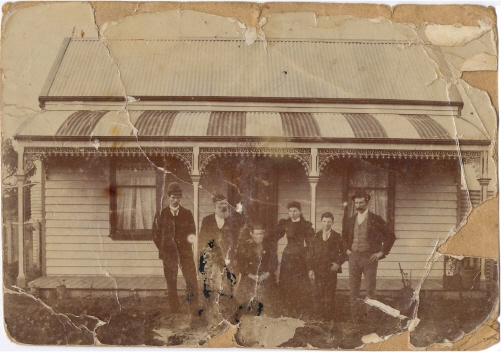
Eliza Howard née Darcy, seated between Patrick Howard and Ella Hancock's mother. Date unknown but probably 1890s.
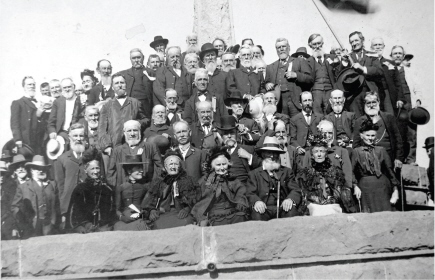
Eureka veterans at the 1904 anniversary, Jane Cuming front row, third from right.
Kind permission Ballarat Heritage Services.
There was little work done in those
last weeks of 1854. The aftermath of what soon became known as the Eureka Stockadeâthe
AGE
newspaper gave the bloody event this name on 20 Decemberâtook its toll on the usual bustling hive of end-of-year industry. First there were the funerals; then came the removal of incinerated tents, the stocktake of decimated business and the shelter of homeless families. There were preparations for Christmas too. And all under the blazing sun of a summer hot spell.
But there was another matter more pressing than the body count, the burnt-out ground of the Eureka or the baking of mince tarts. There was the matter of the races.
The races are the absorbing topic
, noted the Ballarat correspondent of the
GEELONG ADVERTISER
on 27 December. The inaugural Ballarat Race Meeting had been planned for months. The event was intended to rival
the oldest and best regulated courses in this colony
and put the fledgling goldfields town on the sporting calendar. A weighing machine had been purchased at great expense, a track cleared some seven miles from the Camp, near Bald Hills, beyond Waldock's Station, and stewards appointed for the five-day meet, which was slated to commence on 12 December. Prize money had been collected for the Hack Race, the Maiden Plate, the Camp Purse, the Ballarat Town Plate, the Publicans Purse, the Gold Diggings Plate, the Consolation Stakes and the Ladies Purse: a rollcall of Ballarat's social taxonomy as clear as the blue sky itself.
But, according to the
BALLARAT TIMES
, the
recent disturbances were ill calculated to promote sporting affairs
. There was also the considerable complication that two of the stewardsâMessrs Rede and Johnstonâwere more likely to be lynched than listened to should they appear before a drunk and festive public. Johnston, noted the
BALLARAT TIMES
,
always sounded as if he was insulting you
, adding generously that
perhaps he could not help it
. Rede, the paper conceded, was an
accomplished scholar
and
generous donor
to charitable causes, but
his manner
set everyone at odds. For their own safety, both Rede and Johnston had left Ballarat shortly after the Stockade clash.
So the first race day was rescheduled for Boxing Day and new stewards were appointed, neutral men unlikely to incite another riot. But still the fates were cruel to the sport of kings. Four thousand post-Christmas revellers walked the seven miles in scorching heat to the racecourse only to discover that the weighing apparatus had been accidentally damaged and the first race postponed indefinitely.
It is too much to expect large assemblages of people to remain patient under a scorching sun
, noted the
TIMES
.
Liquids of all kinds
were
eagerly sought for
. Ice sellers did a roaring trade, while pickpocket gangs swarmed from one
hard drinking
circle to the next. Sarah Hanmer was in attendance but got herself into
a difficulty
that soon gave rise
to a good deal of yabberâ¦too private and intricate to publish.
By the time new scales had arrived and Mr Keating's bay horse
had it all his own way
in the Hack Race later that evening, the crowd was legless.
On day two, clouds of dust billowed in the arc of a northerly gale. The faces of punters looked
as if at a masquerade ball
, so besmeared with topsoil and sweat that you couldn't
recognize your most intimate friend.
Then the seven-mile stagger back to the diggings, only to repeat the trek the following day. One party, who had hired a horse-drawn conveyance to relieve the slog, had cause to regret their indolence when the buggy overturned, resulting in serious injury to several passengers.
Next the temperature plummeted and
a perfect deluge
flooded the track.
A sudden change of the weather,
noted the
TIMES
,
rendered a visit to the course more an act of martyrdom than pleasure
. By the end of the stormy third day, when the Ladies Purse (
presented by the Ladies of Ballarat and Creswick of not less than 100 sovereignsâ¦1 mile and a half, 11 stone; gentleman riders
) was taken out by Mr Waldock's St Patrick, the people of Ballarat must have wondered whether they were being punished for something.
But their suffering was rewarded.
With Old Father Christmas
, concluded the
TIMES
,
five days' good racing, and a race dinner and ball crowded into one week, we ought to have enjoyed ourselves
. William Westgarth, who was in Ballarat as a member of the Gold Fields Commission of Enquiry established by Governor Hotham to investigate the root cause of miners' grievances, thought the races
a most absorbing spectacle.
1
A week-long holiday had scuttled the gold escort (the armed guard transporting gold to Melbourne) but done wonders for the morale of a community beset with trauma,
sickened by hope deferred
.

New Year's Day 1855 was ushered in by an even more absorbing sight than thousands of well-oiled race-goers.
To our readers
, beckoned the editor of the
BALLARAT TIMES
,
A happy new year to you all.
Clara Seekamp continued her leader:
That you may have better health, more wealth, and much more justice this year than during the one just past, is the earnest prayer of your fellow labourerâthe Editor.
With her husband awaiting trial on charges of sedition, Clara Seekamp took the reins of their family enterprise. She published the list of subscribers to the proposed Miners Hospital: topping the list was Sarah Hanmer with a generous £53 donation. (The second-largest contribution was from Robert Rede.) She published a letter from Jewish auctioneer Henry Harris, beseeching the Ballarat community to come to the financial aid of those
unfortunates who have innocently suffered from the late fearful entente on the Eureka [when] women became widows, children fatherless.
There is also a letter from âQuartz', encouraging people to write to
the enquiry into the late massacre
and
make suggestions to the Commission on political questions
.
There are many remarkable features of the New Year's Day paper, but the most outstanding is by far the least prominent. Edition 45 of the
BALLARAT TIMES
, Monday, January 1, 1855, bears a small imprint in the bottom corner of the last column of its final page:
Printed and published by Mrs Seekamp, Ballarat
.
These seven little words encapsulate the other insurrection that had occurred in the watershed year of 1854.
When a few hundred polyglot gold miners hastily constructed a rough palisade around fifteen tents on the Eureka Lead, they intended to provide a place of armed refuge for unlicensed diggers against the legally sanctioned licence hunts designed to oppress, entrap and emasculate them. They raised a flag that would fly beside the French, German, American, British, Canadian and other standards that were customarily flown at public meetings. They called it the Australian Flag. Standing below that flag's simple, geopolitically specific design, they swore an oath to stand by each other to defend their rights and liberties. Those rights, they considered, were nothing more or less than their entitlement as free-born Britons to be treated like men. Not animals, serfs or slaves: men.
